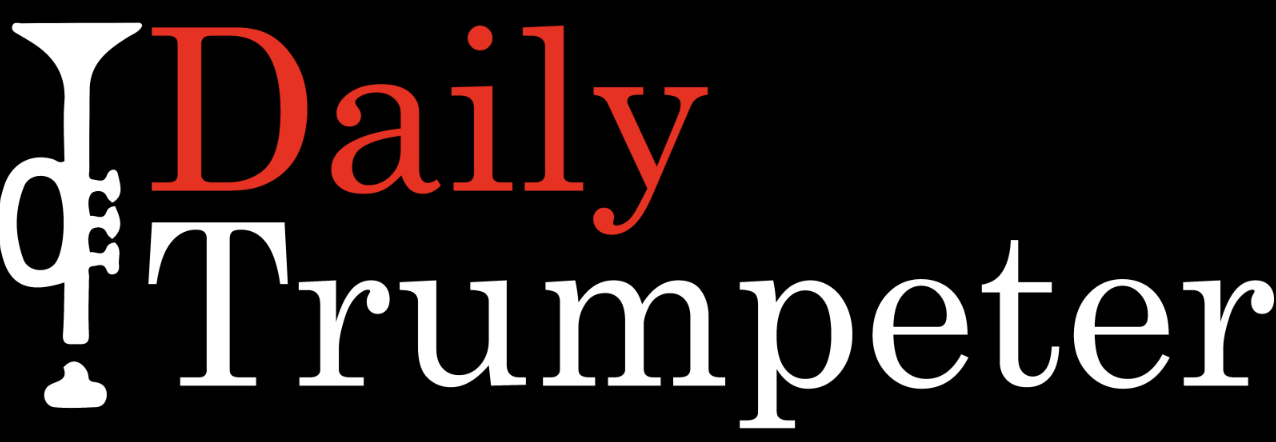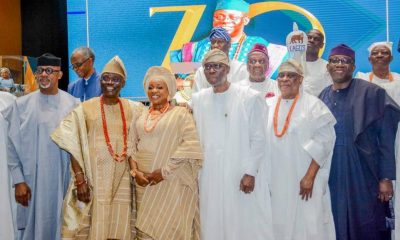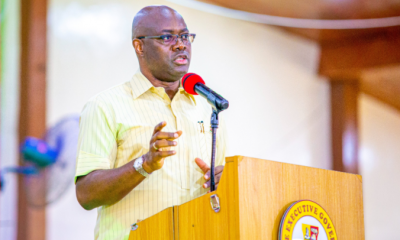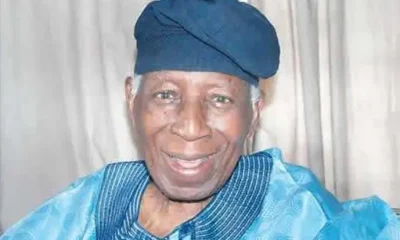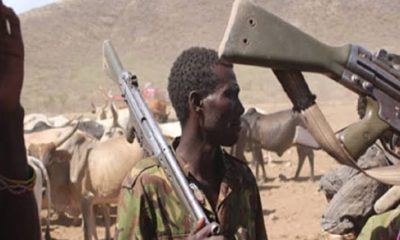Opinion
Festus Adedayo : Ayinde Barrister, North and Tinubu’s VAT Bill
In a gripping but evergreen musical rendition of a Yoruba fictional folksong, late Fuji music lord, Ayinde Barrister, once deployed the canvas of the forest to paint the inequality of the world. In his Fuji New Waves album, he also depicted the acrimonies that follow the sharing of jointly hunted games. What the anecdote tells us is that, if we listen to the unspoken voices of the forest, humanity may find answers to some of its knotty matters. The narrator and about eleven of his friends, had gone on a hunting expedition in the forest. After a very tedious day-long exercise, the crew stumbled on a fleshy Àgbọ̀nrín (deer) which it instantly killed. Excited at having killed such a game as reward for its toil, the hunting party whistled excitedly home, the day-long hunting barely allowing them to lift their languid legs. The hapless animal was strung to the neck of one of them like a priceless necklace, blood dripping from its mouth. On getting to the village, the antelope’s furs were instantly heated with fire, derobing it of its earthly clothe. A knife was then slit into the depth of the animal’s smoked belly, making it easy to heave out its entrails. Now, it was time for sharing of the pieces of the antelope’s flesh. Like an offending cat hopping out of the window, equity immediately jumped off the sharing process, sang the musician. The animal’s body parts which hosted chunky meats were then shared among the hunting party’s most vociferous members, leaving the bony huff of the antelope’s back and head for the narrator.
Human interactions, especially when they have to do with fiscal relations, are always characterized by hostile competition, unending struggle and a survival-of-the-fittest syndrome. Since the colonial government’s Phillipson Commission of 1946 which recommended derivation and even development as criteria for distribution of revenue, fiscal interactions among ethnicities in Nigeria have been driven by acrimony. First was the battle to ensure that the fiscal exploitations of the colonial government which put the federal government at an exploitative advantage got reduced. It was followed by struggles to stop post-colonial governments’ attempts to carry on this banner of exploitation. Today, the financial hegemony of the central government over the 36 states and 774 local governments has continued, creating discontent across Nigeria.
According to Dare Arowolo in his “Federalism in Nigeria: Theories and dimensions” published in the Afro Asian Journal of Social Sciences Volume 2, No. 2.2, subsequent fiscal commissions after Phillipson’s haven’t eased anger and agitations on an equitable sharing formula for Nigeria. The 1951 Hicks-Phillipson Commission did same. So also did the Raisman Commission of 1957 which recommended percentage division of 40% to the north, 31% to the east, 24% to the west and 5% to Southern Cameroon. The 1964 Binns Commission of 1964 also proposed regional financial comparability and percentage division of 42% to the north, 30% to the east, 20% to the west and 8% to the mid-west while the 1969 Dina Commission and the Aboyade Technical Committee of 1977 toed different lines entirely. In subsequence, commissions like the Okigbo Committee of 1980 recommended percentages on principles: Population (4%), equality (4%), social development (15%) and internal revenue effort (5%). On percentages for governments, it recommended Federal (53%), States (30%), Local Governments (10%), Special Fund (7%) while the 1988 Danjuma Commission recommended almost same percentages. Nigeria also made other laws and decrees on revenue allocation like the Decree 15 of 1967, Decrees 13 of 1970, 9 of 1971, 6 and 7 of 1975, with the latest being the Revenue Mobilization Allocation and Fiscal Commission of 1999. All of them were geared towards equitably sharing of Nigeria’s wealth. The above were Arowolo’s research findings.
To underscore the importance of sharing spoils and to demonstrate that the crises that come out of it are not new, let us consider the Òsè Méjì, a verse taken from the primordial divinity called the Ifá corpus system of divination. Apart from this, sonorous renditions of hunters’ poetry called Ijálá or Babaláwo ìyẹ̀rè, the poetry performance of Ifá priests also explains how fiscal battles are based on interests, and that disputes over interests, though as old as man, can set the world ablaze.
This particular dispute was personified by the Òsè Méjì as disputes by Earth and Heaven, called Àjàláyé and Àjàlóṛun, a disagreement that was cast in the mould of hunters disputing sharing of spoils.The Earth and Heaven, who were friends, struck an agreement while on a hunting expedition that, upon their success, they would half the game among each other. However, the two hunters’ guns did not spill a bullet, nor did they kill a game. As they walked home dejected, a pint-sized rodent ran across them which one of them immediately killed. Disappointed at the miniature kill, a palm-size game, when it was time to share it, the two hunters could not agree on their earlier decision to half the animal. Conflict then engulfed the two friends. Virtually all earthly creations suffered the collateral damage of the friends’ dispute. Death, barrenness, drought and other afflictions stalked the earth. Seeing this conflict’s potentials to upturn the earth, Vulture came to the rescue. She gave herself as sacrificial lamb to carry a mitigating sacrifice to God, the Olodumare. It was only thereafter that the umbilical cord that twines the Earth and Heaven was restored through a peaceful settlement of the rift.
Like the crises that usually follow sharing of spoils in a hunting expedition, last week’s transmission of four bills aimed at overhauling the Nigerian tax system to the National Assembly by the Bola Tinubu administration got engulfed in controversy. The bills are: the Nigeria Tax Bill 2024, the Tax Administration Bill, the Nigeria Revenue Service Establishment Bill, and the Joint Revenue Board Establishment Bill. The one that got mired in controversy the most was the one which proposes changes to the sharing formula of the Value Added Tax (VAT). The new bill wants states where VATs are generated to have accrued to them shares that tally with their consumption. By this, states which have less consumption will have less accruals. It sounds equitable, doesn’t it? One of the bills also reduced FG’s share from 15 to 10 percent but with a caveat that the allocation to states will consider the derivation principle. Almost immediately, the Northern Governors’ Forum rejected some of the proposals, especially the VAT sharing template. It reached this resolution last Monday after the governors’ meeting in Kaduna. Governor Muhammad Inuwa Yahaya of Gombe State, who read the communiqué of the meeting, said the tax bills were aimed against the interests of the North and that the northern governors would instruct northern lawmakers to reject the bills.
What are the interests of the north that the bills will jeopardize? Tax experts have said that two sets of the tax bills, which were handiworks of the Presidential Committee on Fiscal Policy and Tax Reforms, headed by Taiwo Oyedele, had revolutionary zeal similar to that of Nicholaus Copernicus. Copernicus was a mathematician, astronomer and Catholic canon whose unexampled formulation of a model of the universe placed the Sun, rather than the Earth, at the center. Said the tax experts, as Copernicus altered centuries-old conception of the Earth and the Sun, Oyedele, by significantly altering the distribution of VAT revenues among Nigeria’s federal, state, and local governments, was revolutionizing Nigerian tax system along the path of equity. But northern governors think differently.
Under the current tax law regime, VAT is split in a 15, 50 and 35 percent model between the federal, states (including the Federal Capital Territory), and local governments respectively. The portion attributable to states (and perhaps LGAs) has states retaining 20 percent of the VAT revenue collected within their borders. Thirty percent of the VAT is distributed based on the population of the states, while the remaining 50 percent is shared equally among all states. However, the most strident criticism against this formula is that it does not give consideration to, nor does it have any regard for the principle of derivation. Don’t forget that the major kernel of advocacy against the fiscal regime being practiced in Nigeria today is that, under it, the principle of derivation is in abeyance. This led to cries against perceived inequities in the sharing of games after a month of Nigerian-wide hunting expedition. States and regions that contribute more to VAT do not receive proportional benefits from the sharing.
Talking about sharing of games, in an earlier piece I did, I submitted that hunting expeditions could fittingly explain the inequities in Nigeria, including distribution of Nigeria’s wealth. When a hunting crew embarks on this journey, it divides itself into two. The first is one that holds dane-guns; it often comprises two or three persons. There is then the other crew, usually many, as many as ten, called the “forest encircling hunting group.” The job of this group is to encircle the identified forest for game-hunting. With sticks, stones and any other objects, they make sufficient noise and discomforting howls to unsettle animals from wherever they are holed. The aim is to get the animals suddenly fleeing their holes and scampering to other parts of the forest in a hurry. In the process of fleeing, they run into the hands of the crew of about three whose guns are readied to be cocked. Then the escaping animal gets pounded by a fiery volley of bullets which immobilizes it and prepares it as a fitting gourmet for dinner.
Games successfully hunted, the hunters then heave the animal on a journey back to the village. It is time for sharing the meat, the spoil of the hunting expedition. The crew that encircles the forest, which disrupts the animal from its hole, is decidedly, actually the one that does the most herculean of the hunting expedition. It is comparatively less armed and harm could easily come its way. It also exerts the greatest energy, having to walk inside thorns, briers and thistles in the process of getting the animal to scramble off its comfort zone. The other crew merely holds the gun and shoots when the animal attempts to escape. But, in the sharing of the now dismembered animal, the sharing formula does not follow this pattern of contribution to the hunting. The shooting crew gets the chunkiest part, ranging from the thighs, the neck to even the torso while the “encircling crew” is given less meaty parts.
But, Yoruba Apala music lord, Ayinla Omowura, underscored the superiority of the “shooting crew” over the other crew. Apparently excoriating his musical adversaries, he likened his superiority to that of this crew that shoots the animal. In one of his songs which he entitled E f’àwon wèrè sílè (don’t mind the incorrigible lot) he likened his adversaries to the “bush encircling crew” whose job was “merely” to get the animals run to him, a man whose gun was cocked to shoot. Between him and them, the world should judge who was the most superior, the real hunter, he boasted. Leave the incorrigible lot alone; let them disrupt the peace of the animals in the bush (while we shoot) and let the world assess who is the greater hunter between us – E f’àwon wèrè sílè k’ón rúgbó sí wa k’á w’aperan t’ó bá yanjú, he boasted.
Under the new Tinubu tax proposal, the VAT distribution would shift to 10 percent, 55 percent, and 35 percent for the same respective tiers of government, with a critical twist: 60 percent of the VAT revenue would be distributed based on derivation. This means that where VAT is collected becomes as crucial as the amount collected, potentially favouring regions where consumption activities are concentrated. A few years ago, Rivers and Lagos States headed for the court to seek legal interpretation of the VAT sharing formula which appears to have been temporarily settled through political means.
The Northern governors’ rejection of the VAT bill is in line with the region’s ancient resistance to the principle of derivation. Southern support for derivation also follows its forefathers’ belief that disregard for derivation approximates street wisdom’s resistance to “monkey dey work, baboon dey chop.” To those who want derivation, it will ensure equitable distribution of income but to the latter, there is the need for fiscal equalization. Before the Tax bills, the criteria Nigeria deployed for allocating resources to the tiers of government violated rational consideration, except for other primordial considerations. Allocating unearned money to states strengthens their renteer drive and weakens the revenue generation drive and capacity of other states. It makes states dependent on the monthly doll-outs from FG.
Like the two hunting categories – the “shooting” and “bush encircling” crews – when it comes to VAT, the new Tax Bill seems to preference “the bush encircling” crew, those who make the greatest sacrifices in the Nigerian hunting of game. It is obedience to that principle which the Niger Delta, where Nigeria’s crude oil is sourced, is demanding from Nigeria. The North, too, should ask that VAT be paid on cows, rams, onions and tomatoes which are within its remit. I learnt that though pasta, malted chocolate drink mixes (Bournvita and co), sugar and many others, though manufactured in the west, are consumed hugely by the north. The Northern governors should push for the domiciliation of the VATs collected from these commodities in the north where they are consumed. In that wise, we will not all be pushing for someone to eat where they did not sow.
That same philosophy was behind bandits’ vandalism of the TCN towers along the 330KV Shiroro-Kaduna lines 1&2 recently which threw 17 northern states into darkness. The lines, enveloped by a thickly forested area infested by bandits of savage and violent inclination, was the target. These ones, like their contemporaries in the North East, the Boko Haram and the bandits, easily include transmission line vandalism among the list of their evil conducts. So, when the north made so much hoopla that it was all alone in darkness, it needed be told that the south didn’t breed power transmission bandits. Two northern states – Niger and Zamfara – are the greatest security burdens of Nigeria today. Those bandits didn’t wake up to be societal nuisances in one day. They are the neglected out-of-school children of decades back who have now morphed into a full plumule of violence. It is said that a mother who births an irresponsible child should back him – eni bí’mo òràn níí pòn ón.
Jamaican reggae music king, Bob Marley, in his Small Axe track, reinforced this Biblical truism when he sang that, “whosoever diggeth the pit shall fall in it.” Yes, the FG has the responsibility of ensuring the welfare of all but let the north acknowledge that its leaders, past and present, coupled with an acute dependency culture, salted by religion, have brought not only the north but the rest of Nigeria into this unfavourable fiscal and security situation. Nigeria currently spends huge portion of its revenue fighting the Almajiri of yesterday who have become bandits, and Boko Haram terrorists of today. God bless Patience Jonathan. Her theory of “born trowey” which queries why the North must not take responsibility for the 10 million out-of-school children it births and throws away into the cold is still germane. The north’s poor choices of leadership in the past, at both sub-national and national levels, have hurt and are still hurting the rest of Nigeria.
Let Sango, the god of thunder’s bellowing strike hit the Bata drum and its surrounding bass accoutrements! Tinubu’s Friday refusal to agree with the National Economic Council’s (NEC) recommendation for the withdrawal of the four tax reform bills is, to my mind, a great move. If Sango must strike, permit it to strike, please. What must not be stopped is the life-saving message from the Bata drum which must forcefully enter the earlobes of the one who has refused to listen.
